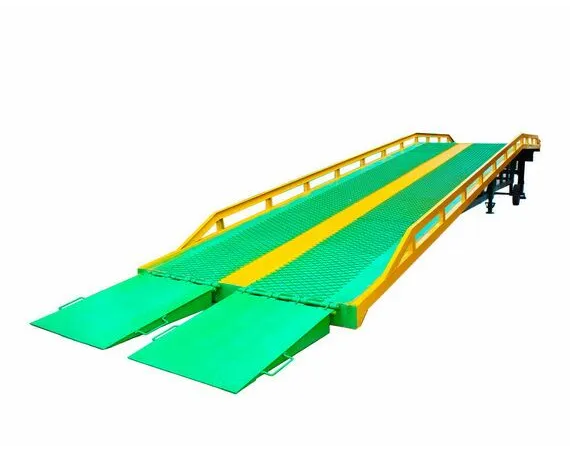Hydraulic Dock Leveler Suppliers Offering Safety and Load Efficiency

In the high-paced environment of modern logistics and warehousing, efficiency and safety are no longer optional—they are operational necessities. At the heart of these functions lies the loading bay, a critical zone where goods move in and out, and where even a slight delay or equipment failure can lead to significant losses. One of the most vital components supporting safe and efficient loading operations is the hydraulic dock leveler. That’s why working with experienced hydraulic dock leveler suppliers is crucial—choosing the right equipment, guided by the right supplier, can make all the difference between streamlined workflow and frequent disruption.
Understanding the Role of Hydraulic Dock Levelers
A hydraulic dock leveler is a bridge that compensates for the height difference between a warehouse dock and a vehicle bed. Unlike mechanical alternatives, hydraulic models offer smoother transitions, higher load capacities, and minimal manual intervention. They are engineered for consistent performance, especially in facilities where high-frequency loading and unloading is part of daily operations.
These levelers help eliminate common risks such as forklift tipping, trailer creep, and back strain caused by uneven dock surfaces. More importantly, when properly integrated into a facility’s logistics framework, they enhance operational speed and safety in measurable ways.
Why Supplier Selection Matters
The performance of a dock leveler depends not only on its design but also on the expertise of the supplier. Hydraulic dock leveler suppliers bring more to the table than just product delivery—they contribute to equipment longevity, site-specific recommendations, and compliance with safety regulations.
A reliable supplier provides guidance on model selection based on usage patterns, load weight, and dock design. They ensure the leveler is engineered to handle heavy-duty applications, withstand harsh environmental conditions, and meet industry safety standards. Additionally, a dependable supplier backs the product with after-sales support, maintenance protocols, and replacement part availability.
Whether you’re operating a warehouse, distribution center, or industrial facility, partnering with an experienced supplier is the first step toward safer, more efficient operations.
Safety as a Core Requirement
When it comes to loading docks, safety is paramount. Accidents during loading and unloading are unfortunately common—and often preventable. Hydraulic dock levelers contribute to accident prevention in several ways:
- Automatic Lip Extension: Eliminates the need for manual handling, reducing worker injury risk.
- Controlled Platform Descent: Ensures a smooth and stable connection between the dock and the truck, minimizing sudden drops.
- Built-in Safety Stops: Prevent platform movement during maintenance or inspection.
- Non-slip Surface Materials: Offers added traction in wet or oily conditions, protecting against slips and falls.
Selecting a supplier that prioritizes these features—and knows how to properly configure them—is essential. An experienced supplier will also advise on proper loading bay layout, vehicle restraint systems, and traffic management strategies that complement the dock leveler.
Efficiency in Material Handling
Operational efficiency is another vital area where hydraulic dock levelers excel. Their ability to quickly adapt to various trailer heights and vehicle types leads to faster loading cycles and less downtime. This, in turn, boosts throughput without increasing labor.
In high-volume facilities, the time saved per truckload can translate into significant annual savings. Moreover, by reducing the strain on material handling equipment and vehicles, hydraulic systems help extend the life of forklifts and reduce maintenance costs.
Efficiency doesn’t stop at speed. Reduced noise, energy efficiency, and smoother handling of sensitive or fragile goods are all indirect benefits of a well-chosen hydraulic dock leveler solution.
Adapting to Facility Needs
No two facilities are the same. Layout, dock height, traffic volume, and the type of goods being handled all influence which dock leveler setup is ideal. In some cases, a facility may not have a permanent dock at all. That’s where flexible alternatives become invaluable.
For operations requiring temporary or portable solutions, a Mobile Loading Dock Ramp for Your Facility can be a game-changer. These mobile ramps offer rapid deployment, easy relocation, and compatibility with various truck types—especially beneficial for yards, construction sites, or seasonal fulfillment centers.
Choosing between fixed hydraulic systems and mobile ramps requires careful evaluation. An experienced supplier can assess current workflows and propose the most efficient configuration for long-term use or temporary scale-ups.
Beyond the Equipment: Long-Term Support
What sets superior hydraulic dock leveler suppliers apart is not just their product line, but the services they provide throughout the lifecycle of the equipment. Site audits, load analysis, custom fabrication, and training programs are all value-added services that contribute to the safety and productivity of your operations.
Moreover, suppliers that offer ongoing maintenance packages and rapid-response repair teams help reduce downtime. Their understanding of local compliance standards and safety codes ensures your dock setup remains audit-ready at all times.
Conclusion
In today’s demanding logistics and industrial sectors, optimizing the loading dock is more than a matter of convenience—it’s a strategic advantage. Hydraulic dock levelers serve as critical enablers of this strategy, ensuring a seamless and secure flow of goods.
However, the true value of these systems lies in the knowledge and expertise of the suppliers behind them. Choosing experienced, well-established hydraulic dock leveler suppliers ensures that your facility receives not only the right equipment but also the guidance, customization, and support necessary for sustained performance and safety.
Whether you operate a fast-paced warehouse or a seasonal distribution hub, the right supplier can help you bridge the gap—literally and operationally—between challenge and opportunity.





